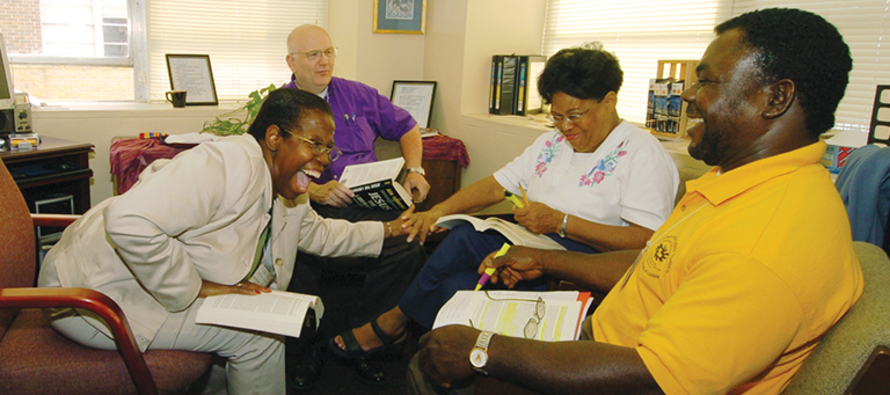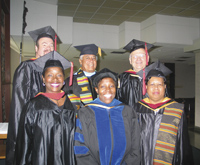For Sister Jamie Phelps, life’s joys outweigh struggles

Image: Sister Jamie Phelps shares a light moment in her office with an independent study group.
ASK SISTER JAMIE T. PHELPS, O.P. what she likes to do for fun, and she laughs—a quick, unstoppable, freight train of a laugh. “First of all," she says, “life is fun."
This from a woman who was getting ready to hop a plane back to New Orleans when Katrina hit. She hadn’t been watching the news, so she thought the hurricane was whirling toward Florida and would miss her home altogether. Blown temporarily out of her job as a professor of systematic theology at Xavier University, Phelps matter-of-factly moved the Institute of Black Catholic Studies she directs. It went north for a time, to the University of Notre Dame. As VISION went to press, she was planning to move back in August 2006—“just in time for hurricane season," Phelps jokes.
Never one to flinch at truth-telling, she has also written about the suffering of New Orleans’ poor in the days after Katrina. “The storm unmasked our collective social immorality," Phelps writes.
Personally, one of the hardest things for her about Katrina was that it smashed apart “my ideal 8 o’clock bright young women course," an undergraduate theology class she’d only taught for two sessions, but which she already sensed had the potential to get an extraordinary group of intelligent young women wrestling with all the right things.
God in the twists and turns
But as much as she enjoys give-and-take with ideas, with her students, and with the world at large, Phelps is always looking for the deeper meaning, for what God is doing in a particular time and place. She entered the Adrian Dominican order straight out of high school in 1959 and has been a sister for more than 45 years, a woman of color in a mostly white world.
And her ministry during that time has twisted and turned, following the tugs of her heart and her intellectual curiosity and the tides of world events, nudged along by such forces as the civil rights movement, Vatican II, the influence of a multi-cultural world on theological thinking, and, most recently, a life-changing storm.
“When we talk about life’s journey and God’s providence, you don’t write and plan this stuff," Phelps says. “But when you look back over your life and you see the people who have touched your life and the journey that you have taken, you can see what my religious formation people used to say: God writing straight with crooked lines. As you get older, these things begin to connect in ways that you couldn’t have designed.
“I don’t live by a five-year plan. You’re trying to discern what it is God wants at a particular moment and a particular time. And you move forward on that not knowing what the next call will be or the next turn in your life will be. But when you’ve lived as long as I have, you look back and you see a wholeness there, you see a continuity there."
Testing the waters
Born in Alabama, the youngest of six children, Phelps grew up in an educated Catholic household in Chicago where her family read newspapers and poetry, studied classical piano, and routinely discussed religion, politics, and sex at the dinner table, and where being a child was considered no excuse for not contributing to the conversation.
“I always tell people, I have an African core, Southern heart, and urban moxie," Phelps says of those early influences.
In the 1940s, hers was the second black family to attend the mostly Irish and Italian St. Matthew’s grade school on the West Side of Chicago. The teachers were Adrian Dominican nuns, the same order she later joined.
Phelps had learned from her parents, Emma Brown Phelps and Alfred Phelps, Sr., that work was a means to help other people. “We were trained that whatever gifts we had," she says, “were gifts given to us by God for the community."
She thought of becoming a nurse, “but I wasn’t too sure I could handle blood." She decided that nuns and priests helped the soul, which seemed to her the highest calling of all. With her grade-school teachers she had visited the Adrian Dominican convent and got to “see their silliness—now I would call it joy. I saw happy women."
But when Phelps tried to join the Adrian Dominicans at the high school they ran, the order’s leaders put her off, saying “they were concerned how would I as a young black woman adjust to living in all-white environment," she recalls.
 |
|
PHELPS CELEBRATES the graduation
of student of the Institute for Black Catholic Studies. |
She wanted to remind them that she’d been one of only three blacks in her class in her Catholic grade school and had graduated at the top of her class. But they insisted she spend at least two years at another high school. Phelps knew all too well that some Catholic orders wouldn’t take blacks at all.
So Phelps went off to a mostly white German-Polish high school, Josephinum, where she had huge fun joining clubs and dancing at the prom—so much fun she waited four years before knocking on the Adrians’ door again.
She debated between college and the order, and her father was skeptical about whether the Adrians would ever treat her as an equal. But “I said to myself, you don’t want to wake up 20 years from now thinking, ‘I should have, I ought to have, I could have.’ So let’s get this out of your system. Go see if God is calling you. You need to check it out."
Faith and work
Now, more than four decades later, she writes of maturing in faith as part of a community, of sharing with her Adrian sisters decades of prayer, laughter, and struggle. “I have grown in wisdom, age, and grace as I have journeyed with members of my religious community," she writes, and the times of conflict have been far outweighed by learning and joy.
As a Dominican sister she has taught everything from first grade to graduate students, worked for a decade as a psychiatric social worker, earned a doctorate in systematic theology from The Catholic University of America, and been involved in parishes trying to figure out how the liturgy could be celebrated in particular cultural contexts. Phelps delights in telling stories, in singing and dancing with her elementary-school students, in the lessons she learned about unconditional love and being the body of Christ from the mothers in Chicago housing projects.
She studied sociology after people kept asking her what blacks thought or felt about certain things. She didn’t want to answer without some facts to back her up. Working with two black parishes, Phelps got involved with liturgical reform and became inspired to use something other than lukewarm folk music for worship. She thought, “There’s got to be some better religious songs than that." So she marched into a gospel music store.
Some people were upset with what Phelps came back to use in Mass, calling it Baptist music. “I said, ‘No, this is black religious music that the Baptists have kept in their libraries until we had sense enough to come and check it out.’ "
Through her work with parishes, Phelps acquired an interest in how Catholic liturgy develops in particular cultural contexts. She wanted to work holistically with people; she felt constrained as a social worker in helping people grow their spirituality. She wanted to know more about sexism and racism and economic disparities in society and the church.
So Phelps went off to study, and later teach, theology, working as a professor at Catholic Theological Union, Loyola University, and now Xavier.
What is going on
Phelps has made her way, as an intelligent, strong-willed African American woman in a culture that did not always value those qualities. Today, Phelps says she would encourage people to consider a religious vocation. It has been a rich and satisfying life for her.
But she doesn’t sugarcoat the realities for black Catholics. “We are still operating today in a society that still does not believe that the average ordinary black that’s born into the society is equal to the average ordinary white born into the society," she says. “We’re still working out of a white supremacist ideology that says that being white is ontologically superior to being black. And no one in polite company would ever say that. But that’s what I see going on."
She knows blacks who clearly felt called by God but who weren’t accepted by religious orders or seminaries. That’s part of the reason, she says, why the Catholic Church has relatively few men and women of color in religious life and why there have been separate religious orders for black women.
“There’s some kind of way where we’re not being seen as fully Catholic and as fully human as other Catholics," says Phelps, who’s a charter member of the National Black Sisters’ Conference. “I’ve been watching this for a long time and it really has not changed."
Yet she sees just as clearly the joys and satisfactions of religious life. “I gave up all for the sake of the gospel, but I have all that I gave up and more!" Phelps has written. “I want for nothing materially. I have no husband or children born of my flesh, but count hundreds of students as ‘my children’ loaned to me while they are in my classes to nurture intellectually, personally, and morally . . . . I became a woman religious but that did not preclude my also being an educator, psychiatric social worker, community organizer, liturgist, choir director, spiritual director, and theologian."
It all comes back
After Katrina, Phelps had to call up her superior and say that her nearly new car had been parked at the New Orleans airport and “it may be floating down the river." The furniture the order had bought when she’d moved to Louisiana two years ago might be destroyed. “Her response to me was, ‘You’re alive! We can replace the car and we can replace the furniture. It’s you that we’re concerned about.’"
The car and the apartment turned out to be fine. That message of love from her fellow sister was a reminder of the depth of all that can be gained by following a calling to religious life.
“Some people look at you as though when you make these vows, you give it all up," Phelps says. “You give it all up, but it comes back a hundredfold."
Tags
Related
- A vocation found on the low road: Profile of Sister Thanh Pham, S.S.M.O.
- Missioned to make connections
- Need-to-knows about becoming a nun
- An art teacher is drawn to something greater: Profile of Sister Lisa Perkowski, I.H.M.
- What a flock of sheep taught its shepherdess
- Sister Vilma’s fearless faith
- Seeing God in a child’s smile: Profile of Sister Marie Elizabeth Jerry, S.S.F.
- Bringing sacred healing to hurting communities
- Sisters help Uvalde move from trauma to trust
- Camaraderie at its best: Profile of Sister Kristine Fernandes, C.S.J. Read More
Most Viewed
- Find your spirituality type quiz
- Questions and answers about religious vocations
- Celibacy quiz: Could I be a nun? Could I be a brother? Could I be a priest?
- Resources for older discerners or those with physical and developmental differences
- About Vocation Network and VISION Guide


 Leslie Scanlon is a writer in Louisville, Kentucky.
Leslie Scanlon is a writer in Louisville, Kentucky.